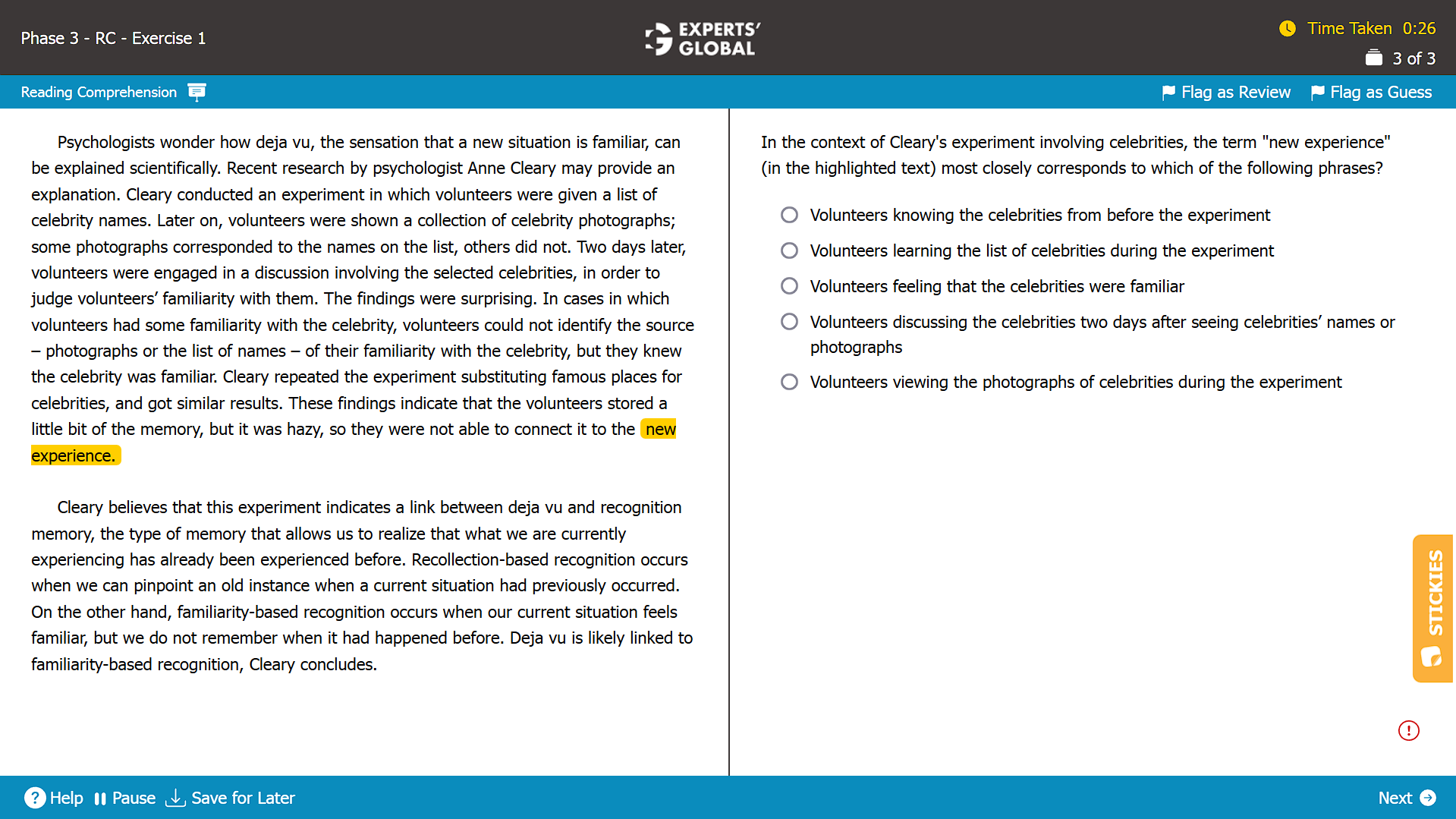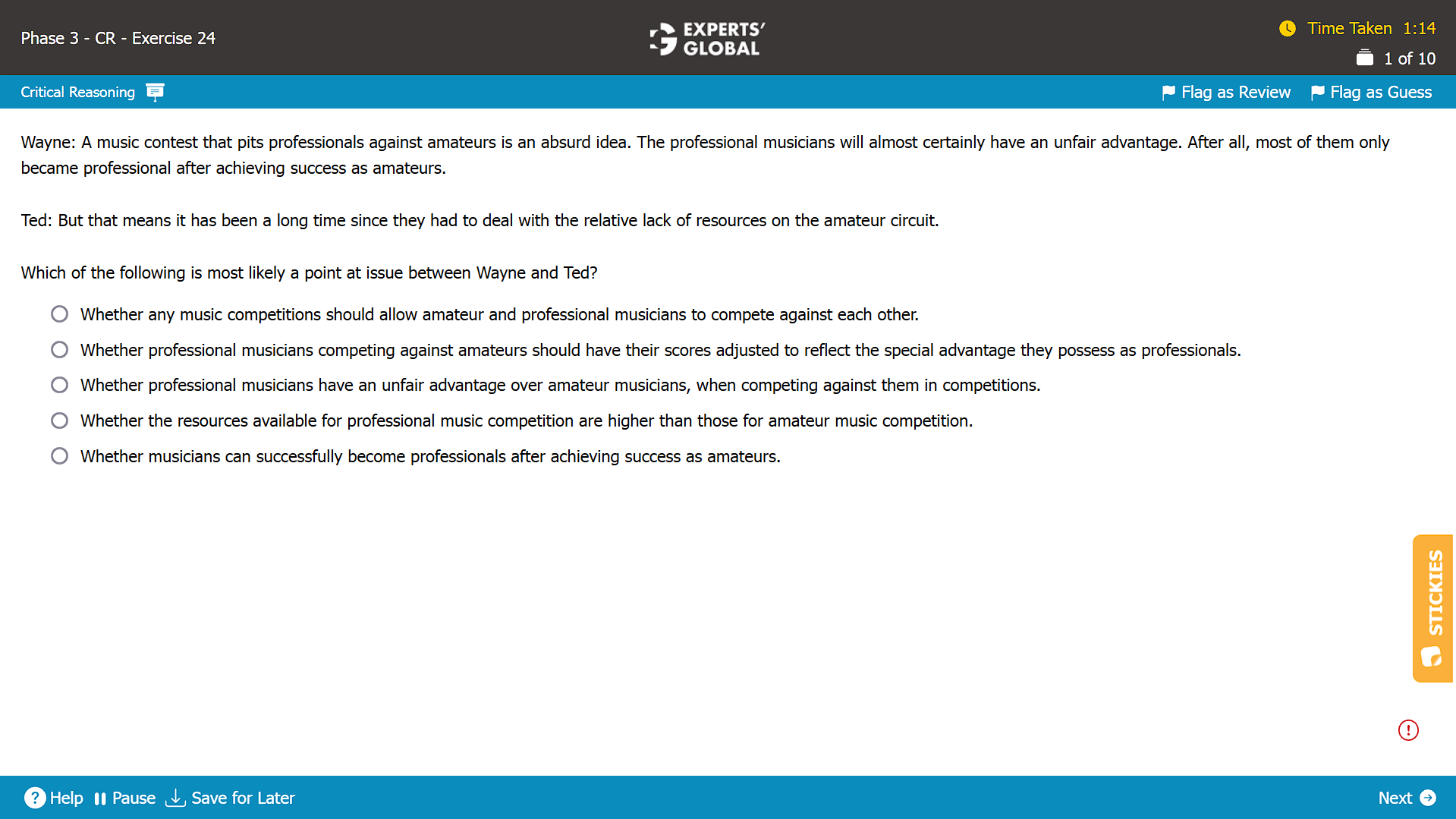Invest 30 seconds...
...for what may lead to a life altering association!
Help Line
- +91.8800.2828.00 (IND)
- 1030-1830 Hrs IST, Mon-Sat
- support@expertsglobal.com
...for what may lead to a life altering association!


The GMAT Verbal section features 23 multiple-choice questions to be completed in 45 minutes, based on two question types: reading comprehension and critical reasoning. The section is question-level adaptive, meaning the difficulty of the questions adjusts according to your performance throughout the section.
To accustom yourself with the GMAT format, take a free full-length GMAT mock test
The Verbal Reasoning section of the GMAT evaluates your ability to comprehend complex written material, draw logical inferences, and critically assess arguments. It tests how well you can process information, identify structure and purpose within texts, and apply reasoning to arrive at sound conclusions. The section is designed to reflect the kind of reading, thinking, and decision-making required in business school and professional management settings. The Verbal Reasoning section is at the epicentre of the GMAT preparation of most aspirants.
The GMAT Verbal Reasoning section consists of 23 multiple-choice questions to be solved in 45 minutes. This section is question-level adaptive, which means the difficulty of each new question is determined by your performance on the previous ones. Each question offers five answer choices, only one of which is correct. This section focuses on reasoning ability, comprehension of written material, and evaluation of arguments. The section is fully built on higher-order thinking and verbal logic.
There are only two question types:
Each of these tests a unique but essential skill that you will need in business school and beyond. Let us explore each in depth.
Reading Comprehension questions appear in sets, each based on a passage. These passages are typically 150 to 350 words long and come from subjects such as business, economics, social sciences, natural sciences, or humanities. Prior knowledge of the subject is not required. The test assesses your ability to understand and analyze information presented in a written format.
Each passage is followed by 3 to 4 questions. These questions can test:
What is the primary purpose of the passage or paragraph?
What role does a certain sentence or paragraph play?
What can be logically concluded based on the passage?
What is the author’s opinion or perspective?
What does the passage state about a particular term or event?
Good performance in Reading Comprehension depends on active reading. You should avoid skimming and instead aim to grasp the structure, tone, and flow of ideas. The passages are rarely written in a direct manner. They require close attention and a methodical approach.

Correct Answer: D
Critical Reasoning questions test your ability to evaluate arguments. Each question begins with a short paragraph or set of statements (called the stimulus), followed by a question stem and five answer choices.
Critical Reasoning question types include:
What must be true for the argument to hold?
Which option best supports the argument?
Which option most seriously undermines the argument?
What conclusion logically follows from the given information?
What information would be most useful to assess the argument?
Which choice best explains the apparent contradiction in the argument?
Which option best describes the roles played by the boldfaced portions in the argument?
Which answer choice best captures the main point of the argument?
The second person responds to the first person by doing which of the following?
Which option most logically completes the passage?
To solve CR questions, you need to identify the conclusion, premises, assumptions, and logical structure of the argument. Avoid using external knowledge. Rely only on the information provided in the stimulus. Logical precision and clarity of thought are critical.

Correct Answer: C
The Verbal section offers 45 minutes for 23 questions. This gives you just under two minutes per question. Some questions, especially Critical Reasoning and inference-based Reading Comprehension ones, can take longer. To maintain pace, you must be strategic.
Suggested strategy:
Accuracy and pacing must go hand in hand. A few wrong answers toward the end due to rushing can lower your overall score significantly.
Many test-takers lose valuable points in the Verbal section due to avoidable mistakes. Here are some that you must stay alert to:
Both extremes reduce comprehension. Find a steady, alert reading speed.
All answers must come from the passage or stimulus. Do not rely on what you know or assume to be true.
Many options are close but incorrect. Pay attention to absolute words such as “always” or “never,” which often make an answer extreme and incorrect.
Mental fatigue can set in. Practice maintaining attention across dense and abstract passages.
A wrong understanding of what is being asked will lead to wrong answers, even if you understand the passage.
Avoiding these common traps comes from regular, focused practice and deep review of your mistakes.
The preparation for the Verbal Reasoning section of the GMAT can be divided into three well-defined stages: concept development, practice, and mastery. Each stage plays a critical role in building the skills and discipline required for a high score.
The first stage of your GMAT Verbal preparation must focus on building a strong conceptual foundation and developing awareness of the common traps embedded in the questions. This is best accomplished through a structured GMAT preparation course that teaches concepts using practical, example-driven methods rather than dense theory. Take the time to understand the reasoning behind each question type and observe how incorrect answer choices are designed to mislead. Begin solving questions steadily, not with the aim of speed, but to recognize patterns, refine accuracy, and internalize logic. At this point, precision and clarity are far more important than pace.
Once your conceptual foundation is strong, enter the second stage of preparation, which centers on rigorous and disciplined practice. This phase is about striking the right balance between speed and accuracy. Solve a high volume of questions from both official sources and trusted private providers. After each attempt, analyze your errors thoroughly. Identify exactly what went wrong, whether a trap misled you or a flaw in reasoning caused the mistake. True progress in this phase often comes not from doing more, but from reflecting deeply on each misstep. If a concept remains unclear, revisit it. Continuous correction sharpens both understanding and performance.
The final stage of your preparation is about turning effort into mastery. Focus on solving a high volume of official questions and increase the frequency of full-length GMAT mocks. Simulate the real exam environment by taking mocks during the actual GMAT time slot to train your mind to peak at the right hour. Practice in extended sittings to build stamina. Review your error log and notes consistently, and reinforce weak concepts. The objective now is consistent, high-level performance under real test pressure.
By structuring your preparation into the aforesaid, three deliberate stages, you give yourself the best chance to approach the Verbal Reasoning section with clarity, confidence, and control. Verbal reasoning skills develop with time and reflection. The more you internalize the logic of the test, the more intuitive the answers become.
Begin the Verbal section with a clear, focused mind. Anxiety can cloud comprehension and decision-making. A calm mindset helps you read carefully, think critically, and avoid traps.
Do not try new strategies on test day. Stick to the techniques you practiced—whether it is passage-first or question-first for reading comprehension, or your preferred method for handling critical reasoning prompts.
If a question takes too long, make an educated guess and move on. The Question Review & Edit feature lets you revisit and change up to three answered questions at the end of the section, if time permits. Remember, you can score high even with a few errors, so do not get stuck. Stay alert, stay efficient.
Resist the urge to assess how the section is going. Worrying about past questions can affect your focus on the current one. Stay fully engaged in the present.
Leaving questions unattempted leads to a greater penalty than getting them wrong. Always complete the section, even if that means guessing on the final few questions.
If you start early enough, genuine MBA admission consultants can support not only your applications but also your GMAT preparation. They can keep you motivated, help you avoid common mistakes, and share best practices throughout your journey. Most importantly, they can guide you in enhancing your profile while you prepare for the GMAT, ensuring that your application stands out when the time comes.
The GMAT Verbal Reasoning section is a test of how well you read, think, and argue. It evaluates your ability to navigate complex ideas, dissect arguments, and make sound judgments based on limited information. These are essential skills for a manager, strategist, or consultant. Approach the verbal section not as a language test, but as a reasoning challenge. Sharpen your reading discipline, strengthen your logic, and train your mind to focus even under pressure. With practice, clarity, and strategy, you can master the verbal section and unlock a high GMAT score. A strong performance in the Verbal Reasoning section can significantly improve your overall score and open doors to competitive MBA programs. Stay consistent, stay reflective, and you will get there!
Simplify your path with our proven GMAT and MBA consulting services bundle